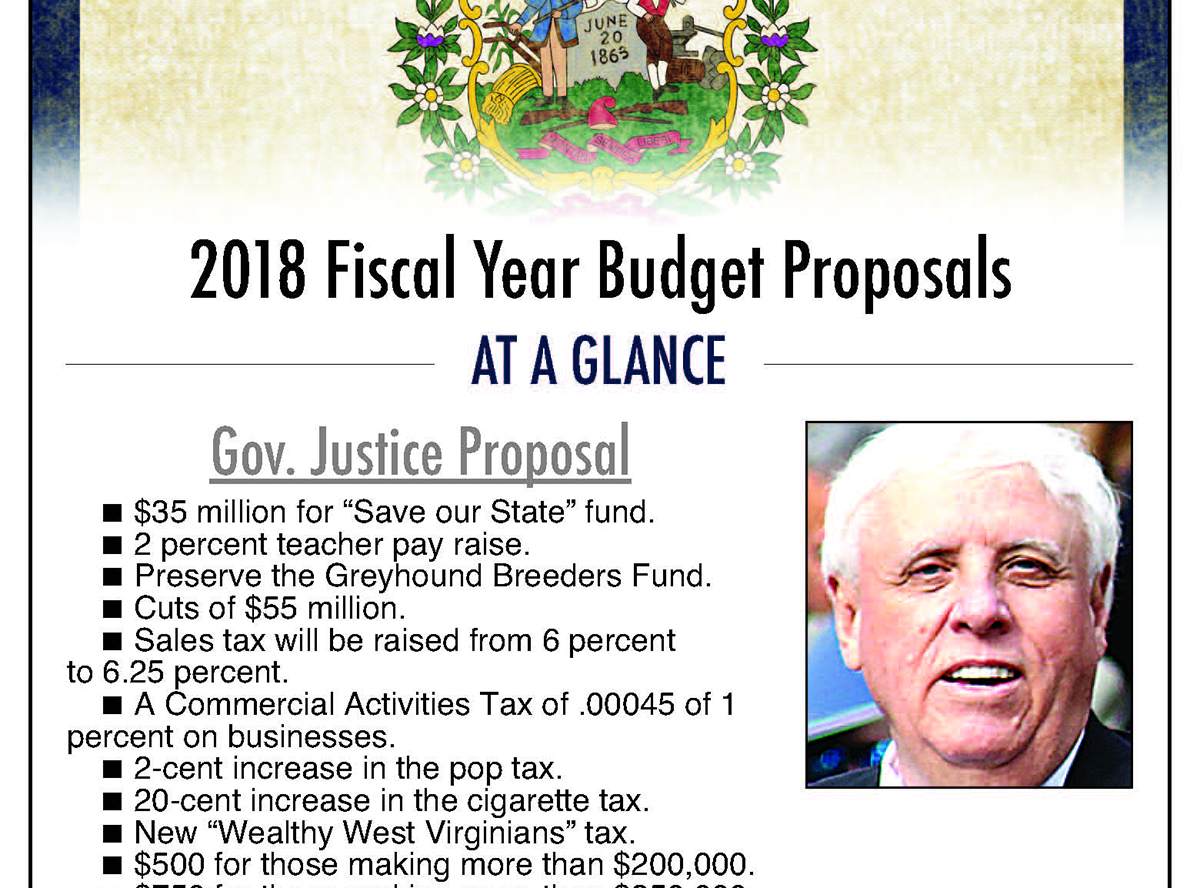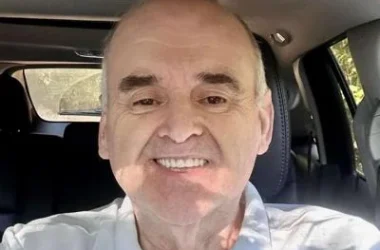By JOSELYN KING
The Intelligencer and Wheeling News-Register
Editor’s note: With days remaining in the 2017 legislative session, West Virginia’s budget situation remains murky, with competing proposals from Gov. Jim Justice, the Republican leadership in the House and Senate and the House Liberty Caucus under consideration. Starting today, The Intelligencer will take a three-day look at the budget proposals, West Virginia’s current tax structure as it compares to our border states and how trying something totally different such as eliminating the personal income tax could help — or hurt — the state’s budget picture and business climate.
WHEELING, W.Va. — West Virginia’s leaders aren’t lacking for ideas when it comes to crafting a state budget. But as the 60-day regular session of the state Legislature grinds through its final week, lawmakers are still honing budget bills, with no clear consensus in sight.

Proposed budget figures set forth by Gov. Jim Justice in his State of the State address on Feb. 8 set state spending in West Virginia for 2018 at more than $4.5 billion — with just $4.05 billion in revenue anticipated.
Since then, lawmakers have been grappling with just how to eliminate about a half-billion dollars from the budget. And most bills proposed to reduce spending have yet to pass the Legislature.
Justice himself has proposed several different ideas since presenting his initial budget, with the most recent coming Monday when he met with business leaders on what he termed a new plan for recovery.
This plan includes a “commercial activities tax” on business and also an annual fee on West Virginians making more than $200,000 annually, starting at $500.
Justice also has condemned legislative leaders for not working faster on the budget process.
Delegate Erikka Storch, R-Ohio, is a member of the House Finance Committee. She said there is a reason why the Legislature always works to finish the budget the week following the regular session.
“We’re pulling it together,” she said. “Some of the legislation being considered negatively affects the budget, while other bills positively impact the budget.
“The budget is not a static document. It’s evolving as we pass legislation.”

As an example, Justice had asked for $105 million this year for a “Save Our State”fund to spur economic development and road improvements. More recently, he has amended that request for $35 million annually over each of the next three years.
Republican leadership, meanwhile, has set forth ideas to slash state spending.
One of these would eliminate the West Virginia Greyhound Breeders Fund payouts, which would provide an extra $15 million next year to the state budget but possibly end the dog racing industry in West Virginia.
That bill currently sits on the governor’s desk awaiting his signature or veto.
“I know if Gov. Justice were to come down to even $15 million for ‘Save Our State,’ and we still were being asked to cut the $15 million for the dogs and we had to make the choice… I’d know where I would stand,” Storch said.
Senate Majority Leader Ryan Ferns, R-Ohio, said the Senate GOP leadership is doing a final lookover of its budget, and is going over details to see if anyone has concerns.
He expects the budget bill to be considered by the Legislature to be similar to a proposal set forth in February by the Republican leadership.
This proposal sought to reduce nearly $278 million from state spending — a plan that included eliminating the Greyhound Breeders Fund.
The budget bill is expected to be introduced at some point this week, and whether it is successful in becoming law “depends on the governor,” according to Ferns.
“The Senate will pass it at mid-week, and we will make good on our promise,”Ferns said. “But we can’t force the governor to sign it.
“Whether or not he will sign it no one can predict. I’m not sure that he knows.”
Justice’s Ideas
Justice’s plan for fighting West Virginia’s budget shortfall starts with a pitch to improve the state’s physical health — and increase taxes to raise the budget to $4.5 billion.
He wants to impose a 2-cent tax per container on “sugary drinks,” raising an estimated $30 million for the state.
In addition, he seeks to hike West Virginia’s cigarette tax by 20-cents a pack — a move that could bring in another $20 million.
Justice has proposed raising the state sales tax a quarter percent to 6.25 percent, and increasing the yearly license registration renewals paid by the state’s drivers from $30 to $50.
He would also like to see a jump in the gasoline tax from 20.5 cents per gallon to either 25.5 cents or 30.5 cents.
His cuts include eliminating the eight regional education service agencies that provide services to public schools and cost the state more than $3.5 million per year.
But the crux of Justice’s proposal is $35 million for his “Save Our State” plan.
On Monday, he also proposed, and is receiving support from groups such as the West Virginia Chamber of Commerce, a .00045 percent commercial activities tax on businesses, which he believes will generate $45 million.
For a business with annual gross receipts of $1 million, the tax burden would be $450.
He also said he wants to preserve the Greyhound Breeders Fund.
Also on Monday, Justice reiterated his call for a “wealthy West Virginians” tax.
This would be structured so that those residents making more than $200,000 annually would pay $500; $250,000 to $300,000, $750; and $300,000 and up, $1,000.
The governor also wants to eliminate the sales tax exemption for telecommunications, raising $60 million; electronic data processing, $6 million; and memberships to health clubs, such as that owned by Ferns, $2 million.
The Republican Proposal
The GOP leadership in the Legislature has put at the top of its list rejecting the $105.5 million initially requested by Justice for the “Save Our State” fund. They also would continue the 2-percent spending cuts implemented last year by former Gov. Earl Ray Tomblin, saving $21.9 million.
Their goal is for West Virginia to spend what it takes in, currently at $4.05 billion.
Teachers wouldn’t get a 2-percent pay increase under the plan, a savings from the governor’s plan of $21 million.
Justice’s request for a $5.6 million increase in tourism promotion also would be rejected.
A $38.3 million transfer for the Workers’ Compensation Fund would be redirected into the general revenue fund, as would $30.9 million in the General Revenue/Lottery Surplus fund.
Republicans would increase the beer barrel tax from $5.50 to $8, with the state expected to receive an extra $2.8 million as a result.
The wholesale liquor tax, meanwhile, would increase from 28 percent to 32 percent.
When totaled, this would come to $277.7 million in new revenue and savings — far short of the $450 million projected budget deficit. Other gap-closing measure are still being considered.
Liberty Caucus Budget
There’s yet a third set of ideas on how best to fund services in West Virginia. Delegate Patrick McGeehan, R-Hancock, a member of the House Liberty Caucus, said the group has come up with a plan that achieves a balanced budget without increasing taxes.
The Liberty Caucus plan would maintain a 2-percent raise for teachers, while fully funding state roads, the Promise scholarship and K-12 education.
“Our budget reduces actual spending inside Charleston agencies,” McGeehan said. “All the cuts we make come from Charleston bureaucracies that are unessential, and that have become bloated over the past decade.”
The Liberty Caucus plan freezes spending, returning it to 2015 levels.
“In some agencies — like in the Department of Commerce — we cut more,”McGeehan said. “With those cuts, we are able to balance with no tax increases. And we still have enough savings for a 2-percent pay raise for teachers.”
McGeehan said he was the only Republican to attend a recent “open house” with Justice’s staff to discuss the budget.
“They said he (Justice) had read our budget, and liked it,” he said. “It has broad support on both sides of the aisle. It’s a rational budget and I think it deserves due consideration.
“But the Republican leadership is refusing to read it, much less take it up.”
See more from The Intelligencer and Wheeling News-Register





